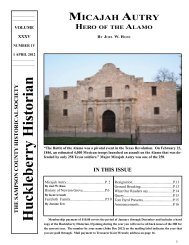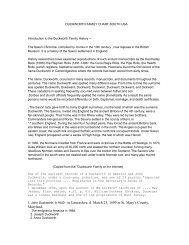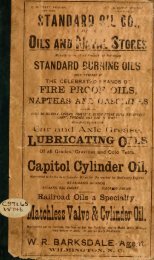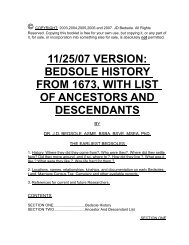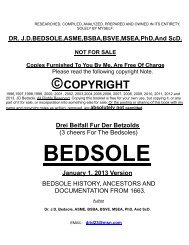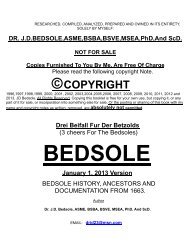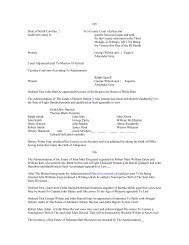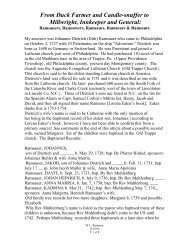Bedsole - NCGenWeb
Bedsole - NCGenWeb
Bedsole - NCGenWeb
Create successful ePaper yourself
Turn your PDF publications into a flip-book with our unique Google optimized e-Paper software.
Patrick Henry, dated 25th April, 1781, a few days after the actual happening, wherein he says: " The<br />
Northward (Shawnee) Indians have been troubling the people very much this spring, in small parties; killing<br />
and captivating and wounding. They come up Sandy River generally, and on the last occasion, penetrated as<br />
far as the settlement on Holston, carrying off a son of Captain Bledsoe's". (Abraham <strong>Bedsole</strong>, Jr.)<br />
Abraham Bledsoe (Sr.) settled on the upper part of Reedy Creek in the year 1730, according to his land<br />
survey, but he was certainly in the area earlier than this date (In fact, he owned land there in 1726) , and on<br />
February 14th, 1728, he was appointed by the Court of Botetourt Co., VA, "Constable in the precinct he lived<br />
in upon Reed Creek." He later moved to Moccasin Creek of the North Fork of Holston River, where he died<br />
near Moccasin Gap in the summer of 1801. His wife was named Catherine, and among his children were:<br />
Thomas Bledsoe, born in North Carolina in 1760 (Actually 1750) and who married on 6 November 1769;<br />
(After all, he could not have married at 9 years old) Margaret Eakin; Abraham Bledsoe, III, and he was<br />
perhaps the one who was captured by the Indians; three daughters, Thely, who married James Eakin,<br />
brother of Margaret who married Thomas Bledsoe; Hetty Bittle and Polly Bledsoe. This is almost certainly our<br />
Thomas <strong>Bedsole</strong>, Sr., and accounts for the reason I could not locate him in NC from prior to his birth until he<br />
was about 27 years old (1777, when he was in the Revolutionary War).<br />
Sharecroppers And Their Annual, End-Of-Year "Settling Up" : My Own Experience<br />
For those <strong>Bedsole</strong>s fortunate enough to own their own land, harvest-time meant they picked, hauled, traded,<br />
stored and sold their produce and crops, for cash and/or trade-goods. But the vast majority of them, like us,<br />
ended up being share-croppers.That means they would work all year for a landowner and when the crops<br />
were harvested and sold in the fall and the costs deducted, the landowner would theoretically share the<br />
difference with the sharecropper. However, since the landowner had made advance arrangements with a<br />
store owner to allow the farmer a specified amount of credit during the year for food, clothing, and farming<br />
tools, the cost of all that had to be deducted from the profits before any profit was divided between them.<br />
In sharecropping, the landowner would guarantee payment in the fall to the store owner and the farmer was<br />
always forced to almost starve his family because the landowner would set such a low credit limit, such as<br />
$300 for the entire year. Even back then, that was not a lot of money. The farmer simply could not adequately<br />
provide for his family on such a small pittance. Imagine, $25 a month for 12 people, which was to pay for any<br />
and all expenses.<br />
Therefore, hunting and fishing were meaningful activities, for acquiring meat. In addition, the landowner and<br />
storekeeper but not the farmer, kept “the record” all year, since the farmers could neither read nor write, this<br />
left the storekeeper and landowner free to overcharge the poor farmers, whatever they could get away with.<br />
But, that’s how share-cropping was done and had been done as far back as anyone could remember. My<br />
own parents also were typical share-croppers their whole lives and that’s how we lived. In late 1926, when<br />
his own father died, my dad, being the oldest son and responsible for his fathers estate, entered into verbal<br />
agreements with a store owner in Alabama, who eventually foreclosed on him and took all my grandfathers<br />
land, eleven houses and property and left us no choice but to become share-croppers.<br />
This did not mean a lot of difference in living for us, though. Although my dad could probably have prevailed<br />
in court in this case, he was very ignorant of the law and procedures and his word was his bond.<br />
PAGE THIRTY TWO<br />
Unfortunately, he thought everyone else with whom he did business was also as honest. That was and still is,<br />
a very big, very costly, and very sad mistake. One I still make myself, which gives you some indication of my<br />
level of stupidity and total lack of intelligence. Anyway, share-cropping meant the landowners made their



